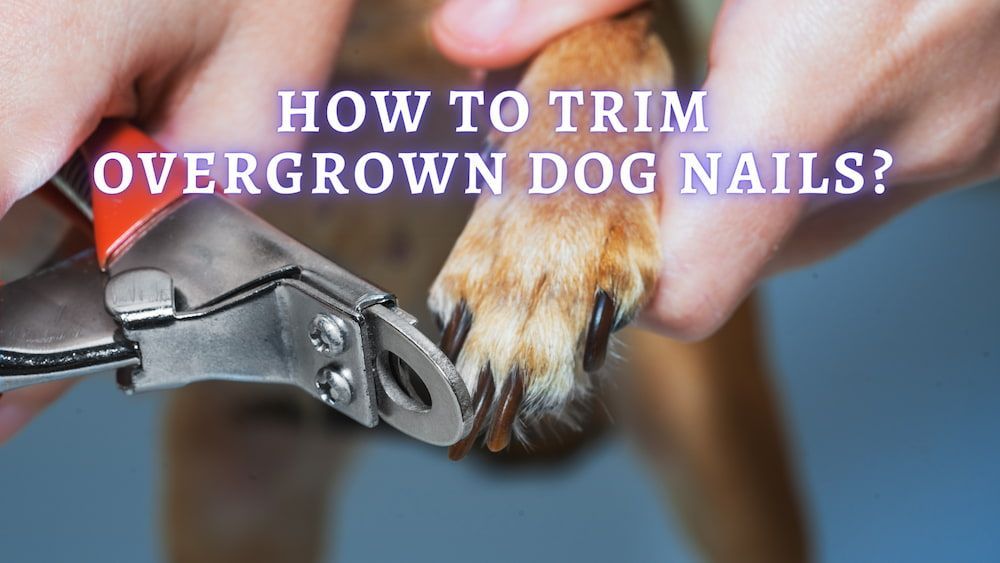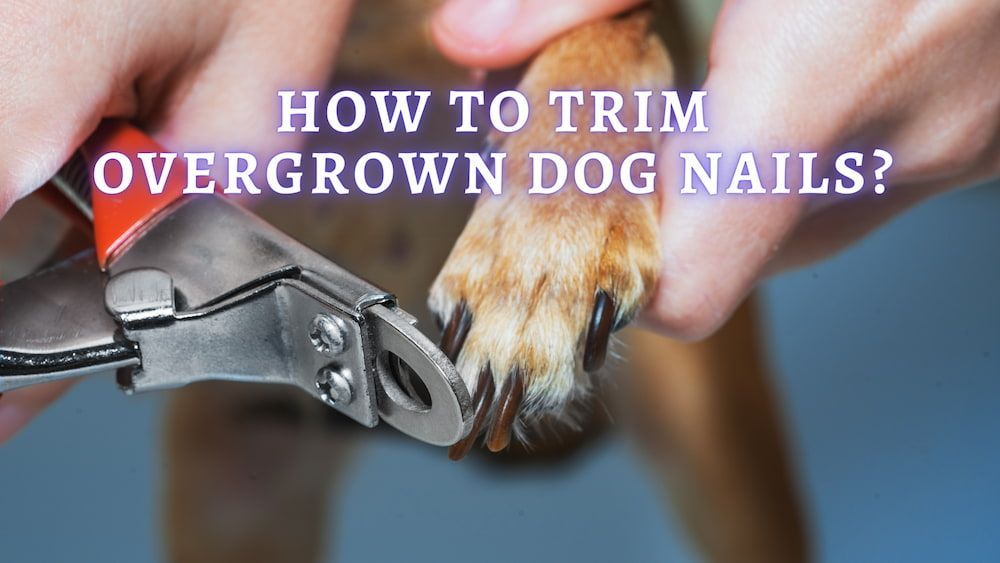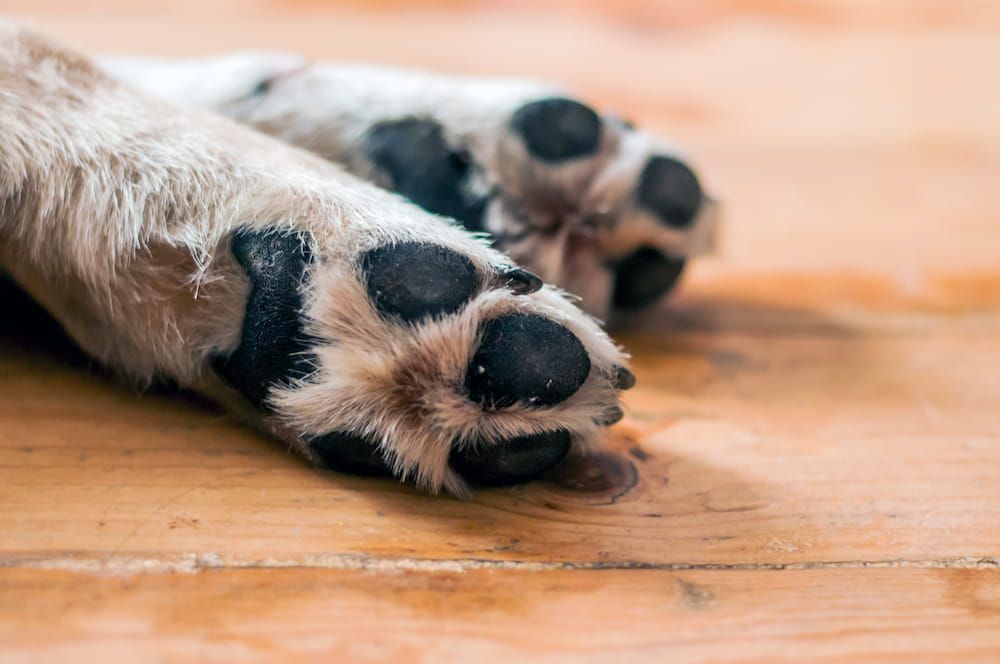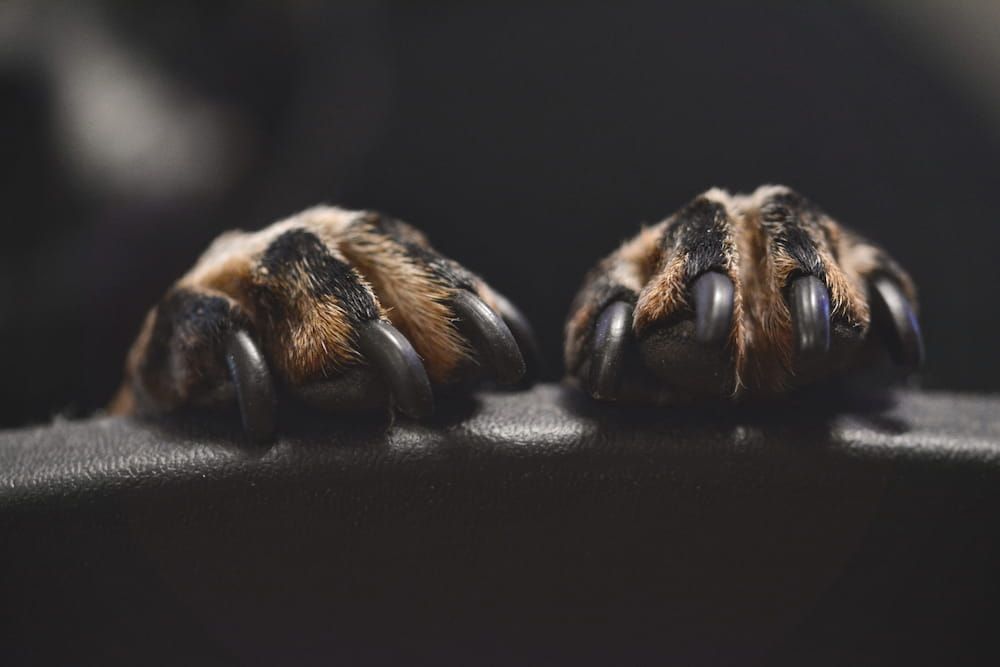
As human beings, when our nails get a little too long, we trim them down. However, domestic dogs do not have that choice. When they need their nails cut, they must rely on their human to recognize the problem before it causes discomfort. Many issues can arise from a dog having long nails, both for the dog and the owner. So it is essential to keep them at a suitable length to keep everyone happy. This article will focus on exactly how to do that.


Photo by @irinacliva from FreePik
Why Are Long Nails A Problem?
Long nails are a problem for a few reasons. Let’s start with the health of the dog itself. Overgrown nails on a dog can lead to discomfort as they can cause the toes to splay, creating abnormal and potentially painful pressure on the feet and legs. If the nails are left to grow, even more, it can even lead to tendon injuries and deformed feet. However, it is important to stress that even before the dog reaches these severe injuries, having long nails is always uncomfortable for them at the very least. If you start to hear tapping as they strut around the house, it is often a good indicator that it’s time for a trim.
Toenails on dogs can also grow so long that they curl around and start to grow into the pad of the foot or toes. This creates painful punctures that can also become infected. Not only do long nails create painful wounds on a dog’s feet, they can also get caught in blankets and rugs, potentially breaking or tearing themselves.
DVM Chyrle Bonk
What are the issues you can face? You will often find that when your dog’s nails get a little too long, they may inadvertently scratch you while they’re playing. Of course, this is an unnecessary discomfort, especially if you have children around. Secondly, long nails are also known to scratch floors and furniture as they move around the house, creating unwanted damage and potential costs for you. All in all, it makes sense for everyone involved to regular trimming.
READ MORE: What to Use on a Dog’s Sore Bum?
How To Trim Dog’s Nails
Most dogs do not like the process, and most owners don’t like doing it, but it’s a necessary job. As long as you get your pet in a comfortable position, as well as being used to the equipment, and cut their nails gradually, you should be fine. You can find a detailed step-by-step guide on the process below.
1. Make Your Pooch Comfortable
Remember, the most crucial first step is always to ensure that your dog is comfortable. This includes being both physical and mental comfort. Many dogs do not like having their nails trimmed, and you may have to first work with this fear with some training. Let them get used to the cutting tools by introducing them over time, letting them sniff them, and rewarding them with treats for doing so. Repeat this over a few days until your dog is pleased to see the tools. If your tools, like nail grinders, make noises, then turn them on and let the dog get used to the noise too. Be patient with this process; it will reward you in the long run.
2. Get In Nail Trimming Position
It is important to have one set position for nail trimming that your pet is relaxed and comfortable in. If you have a second person available to hold them, pet them and keep them calm, that is always ideal. If they are small enough, though, you may be able to hold them in your lap as you trim. Once you have found the best position, pick up one of their paws and move it close to their body so they can’t pull it away while you’re cutting. It can help to squeeze the paw and lift toe by toe as you cut to get better access to each nail.
3. Locate The Quick
Before you start cutting a dog’s nails, you need to know all about the quick. When dog nails grow, so does the quick, which is a collection of nerves and blood vessels at the center of the nail. The bigger the nail, the bigger the quick. Of course, cutting down into a collection of nerves will hurt your pet, so we have to work around that. Inspect your dog’s nails in the light, and you should be able to spot the quick. Light nails will have a pink quick, for example, and there should always be a noticeable color difference. If they have dark nails and it is hard to see, trim bit by bit until you see a grey/pink oval appear, which is quick. Stop cutting when you see this.


Photo by @Dragana_Gordic from Freepik
RELATED: Best Dog Grooming Courses Online
4. Trim Or Grind The Nail Quickly, Safely, And Confidently
Up to this point, you have put the dog in their position, chosen a paw and a nail, located the quick, and are now ready to go. Start by trimming a very small section of the nail, cutting at an angle to move with the natural curve. Following each small cut, inspect the nail for a black dot. This indicates quickness and tells you when the nails are as short as they can be. Try to stay relaxed, worked fast, and do not be nervous; your pet will pick up on this. However, similarly, please do not rush through it as it increases the likelihood of an accident. Make sure to praise your dog for being a good boy or girl and offer them treats.
5. Take Your Time, And Repeat Regularly
Remember to take your time with this process. It is completely normal to need breaks between paws or nails. Sometimes you may even wait a whole day. If you are new to this process, we even recommend these breaks. Just make sure to stay on top of it and cut them regularly once you get into the routine.
What To Do If You Cut The Quick?
Let’s start by saying that everyone has done it, and it’s an easy mistake to make, so don’t feel too bad. It will hurt the dog for a moment, but it really isn’t the end of the world. Just take some styptic powder to stop the bleeding, praise your pet for keeping them calm, and offer them treats, then give them a break for a while for everyone to relax.
If you don’t have styptic powder on hand, cornstarch will work well to stop the bleeding. Just dab the cut end of the nail in a shallow dish of cornstarch or rub it directly onto the nail.
DVM Chyrle Bonk
How Often Should You Cut Overgrown Dog Nails?
The answer to this question is that you should never wait. Once you get nail trimming into your routine, you should be keeping them at a nice length with regular clips. Eventually, it may take just one tiny trim each time to keep them at their ideal length. Remember, it’s always easier to trim smaller amounts of toenail than it is to larger chunks. Some dogs grow their nails faster than others. Some dogs naturally wear their nails down by walking on the pavement etc. The general time frame is a trim every month or so to keep things in check, but you should base it on visual checks as every dog is different. Once you have the dog trained and get into the groove, regular cuts should be quick and painless.


Photo by Kristine Tanne on Unsplash
READ MORE: Why Does My Dog Smell Like Fish?
FAQs:
What Do You Do If Your Dogs Nails Are Too Long?
The simple answer is to cut them! When a dog’s nails get too long, it can cause health concerns for them, including added pressure on their feet and legs, tendon injuries and even deformed feet. Even without these problems, it’s just uncomfortable to deal with for a dog. Not only this, but long nails have a habit of scratching furniture, floors and even owners, so it is important to keep them trimmed for all involved. The trimming process itself should include training the dog to be comfortable around the equipment, getting them into a comfortable position, finding the quick and slowly trimming down until you see a black dot. You should also take breaks as you go and ensure that you praise and reward your dog to put them at ease.
How Do You Cut A Dog’s Nails That Are Curled?
The longer you allow the nails to grow, the more difficult they become to trim. Dog nails often start to curl over when they get really long, until the point that they can actually cut into the paw. Curled nails will be a lot harder to gain access to and trim, but it is still possible. Start at the very tip of the nail and trim ever so slightly, bit by bit. Remember, the longer the nail, the longer the quick, so going gradually is a must. Once you see the black dot, it is time to stop. It would be best if you then cut regularly over the coming weeks and months as the quick recedes again.
{"@context":"https://schema.org","@type":"FAQPage","mainEntity":[{"@type":"Question","name":"What Do You Do If Your Dogs Nails Are Too Long?","acceptedAnswer":{"@type":"Answer","text":"The simple answer is to cut them! When a dog\u2019s nails get too long, it can cause health concerns for them, including added pressure on their feet and legs, tendon injuries and even deformed feet. Even without these problems, it's just uncomfortable to deal with for a dog. Not only this, but long nails have a habit of scratching furniture, floors and even owners, so it is important to keep them trimmed for all involved. The trimming process itself should include training the dog to be comfortable around the equipment, getting them into a comfortable position, finding the quick and slowly trimming down until you see a black dot. You should also take breaks as you go and ensure that you praise and reward your dog to put them at ease."}},{"@type":"Question","name":"How Do You Cut A Dog's Nails That Are Curled?","acceptedAnswer":{"@type":"Answer","text":"The longer you allow the nails to grow, the more difficult they become to trim. Dog nails often start to curl over when they get really long, until the point that they can actually cut into the paw. Curled nails will be a lot harder to gain access to and trim, but it is still possible. Start at the very tip of the nail and trim ever so slightly, bit by bit. Remember, the longer the nail, the longer the quick, so going gradually is a must. Once you see the black dot, it is time to stop. It would be best if you then cut regularly over the coming weeks and months as the quick recedes again."}}]}





